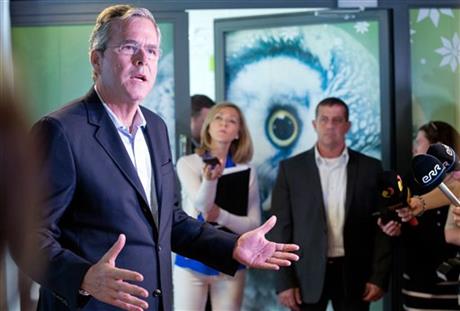
By THOMAS BEAUMONT and VANESSA GERA
Jeb Bush strolled the halls of the Polish parliament, praised Germany’s economic boom since the fall of the Berlin Wall and visited Estonia, a once-bleak Soviet state that now has a growing, free-market high-tech economy.
If the goal was to stoke memories of his presidential father and avoid those of his presidential brother, it seems to have largely succeeded.
“If you think about, in terms of history, my dad’s managing — in cooperation with great leaders of his time … the fall of the Soviet Union. It’s been talked about at every stop we’ve made,” Jeb Bush said Friday.
The former Florida governor, who’s set to enter the 2016 presidential race Monday, never mentioned his brother.
In the U.S., Jeb Bush routinely expresses his love and respect for his brother, former President George W. Bush, who left office largely unpopular with many Europeans, mostly due to his decision in 2003 to invade Iraq.
In Europe, Jeb Bush tried to walk a path that recalled his father, former President George H.W. Bush, vice president under Ronald Reagan and commander in chief when communism receded.
“Think about how much change has taken place in these years,” Jeb Bush said. “It’s a good reminder that we’re a lot freer than we were, and we need to protect that freedom. And that’s why the United States needs to be engaged.”
A statue of Reagan adorns the tree-lined grounds near the Polish parliament building, which Bush visited on Thursday for meetings with government leaders.
Bush said people told him during the trip that in 1987, then-Vice President George H.W. Bush gave a nationwide speech in Poland from Krakow that was uncensored, unheard of at the time in a nation still governed by a communist government.
In a 1989 visit to Poland, the elder Bush said it was the West’s goal to “forge closer and enduring ties between Poland and the rest of Europe.” He returned in 1992, not long after the country’s first free presidential election in six decades, received a hero’s welcome and promised that the U.S. would help the young democracy “to succeed and to prosper.”
When Jeb Bush participated in a private group discussion in Warsaw, “he implied that what his dad did was important for him,” said Agnieszka Komorowska of the East European Democratic Center.
Throughout his visit, Bush stressed that as president, he would renewed the American commitment to its allies in Europe, most notably in their relationship with Russia and its president, Vladimir Putin. Bush called Putin a “bully” who can only be contained by a show of robust force.
“This plays well,” said Michal Baranowski, head of the Warsaw office of the German Marshal Foundation of the U.S. “This visit is seen as important and good, good for Poland.”
Bush said he spoke with officials in Estonia about strengthening bonds with former Soviet republics “so that countries that are totally dependent on sources of energy from Russia have an alternative source of supply to help them with their security.”
Bush’s message was about more than Eastern Europe. He argued that the U.S. needs to play a larger role in leading coalitions around the world to confront Russia and the rise of the Islamic State group.
That was a nod to his father, who built a coalition of nations before countering Iraq’s invasion of Kuwait in 1991. Bush’s brother assembled a smaller coalition when he invaded Iraq in 2003. President Barack Obama has formed a coalition of more than 40 countries to battle IS in Iraq and Syria.
In Berlin on Tuesday, Bush reminded his German audience what strong U.S.-European ties had accomplished, including the reunification of Germany after the fall of the Soviet Union.
“That reunification, as you all know, was not inevitable,” Bush said to a crowd that included German Chancellor Angela Merkel. “But Chancellor (Helmut) Kohl was adamant and my father was deeply supportive. Because of that, Germany is whole and free.”
___
Gera reported from Warsaw, Poland.



